Data Center Management Systems
Data Ager |
|
Data Ager significantly reduces the time and labor associated with System Testing setup. Programmers and QA analysts use DCMS/DAT to quickly adjust all or selected date fields on test files, incrementing the dates by the desired number of days. A recent Data Ager customer realized $350,000 in cost reductions for testing setup during a large project, and estimates they will save another $45,000 per year in labor costs for ongoing testing.
DCMS/DAT significantly reduces project cost and delivery time by automating the test file aging setup process, nearly eliminating the manual, labor-intensive work normally associated with aging test files. Data Ager also improves testing accuracy by making it so easy to regenerate test files that users are seldom tempted to risk reusing out-of-date test files from a previous project.
KRON - The System Date Compensator is now included with the Data Ager. KRON intercepts system date requests and optionally returns a simulated date to applications running on the z/OS operating system.
DCMS/DAT significantly reduces project cost and delivery time by automating the test file aging setup process, nearly eliminating the manual, labor-intensive work normally associated with aging test files. Data Ager also improves testing accuracy by making it so easy to regenerate test files that users are seldom tempted to risk reusing out-of-date test files from a previous project.
KRON - The System Date Compensator is now included with the Data Ager. KRON intercepts system date requests and optionally returns a simulated date to applications running on the z/OS operating system.
The Data Ager system consists of 2 components: the Online and Batch utilities.
Online - The Data Ager Online utility permits you to specify information about the file to be aged, such as its name and the date fields on the file. Each use of the Online utility creates the Data Ager Batch utility JCL needed to accomplish the specified data aging. The JCL can be submitted for immediate execution or stored on a private library for later execution.
Batch - The Data Ager Batch utility actually performs the data aging. It sequentially updates the file, selecting the desired records and incrementing each selected date field. Most typically-used file formats are supported:
Online - The Data Ager Online utility permits you to specify information about the file to be aged, such as its name and the date fields on the file. Each use of the Online utility creates the Data Ager Batch utility JCL needed to accomplish the specified data aging. The JCL can be submitted for immediate execution or stored on a private library for later execution.
Batch - The Data Ager Batch utility actually performs the data aging. It sequentially updates the file, selecting the desired records and incrementing each selected date field. Most typically-used file formats are supported:
- Sequential (QSAM) fixed-blocked (RECFM=FB)
- Sequential (QSAM) variable-blocked (RECFM=VB)
- VSAM key-sequenced datasets (KSDS)
- VSAM entry-sequenced datasets (ESDS)
- VSAM relative record datasets (RRDS)
1. The Initial ISPF screen prompts the user for the following
information.
- Provide the COBOL record layout member, library and access method (CA-Panvalet, CA=Librarian or PDS)
- Provide the name of the file to be aged and file organization type
- Specify if Selection Criteria is to be used to optionally process only a portion of the files records
- Optionally choose if Automatic Date Selection is to be used, allowing DATA to find and select all fields containing the word 'date'
- Provide the number of days that each selected date will be incremented
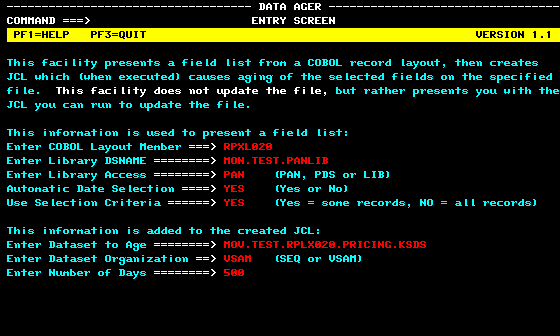 |
2. When the Selection Criteria option was chosen, the second ISPF screen prompts the user to define which records are to be selected for aging.
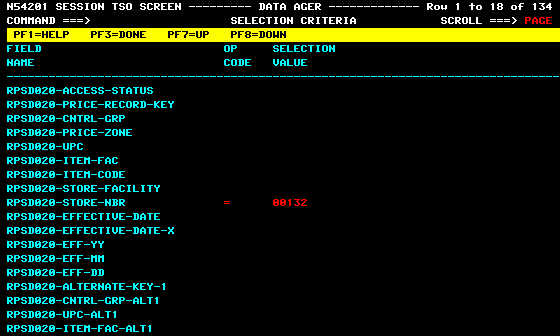 |
- Data Ager presents a list of Field Names found in the specified COBOL record layout.
- The user chooses which fields are used in the selection criteria by entering an operation codes and field value on the corresponding line.
- Valid Operation codes are EQ or =, NE or ¬=, GT or >, LT or <, GE or >=, LE or <=.
- The Selection Value is the value to be tested in the associated field.
3. When Automatic Date Selection was chosen, the third ISPF screen is repeated for each field that contains the word 'Date' in the field name.
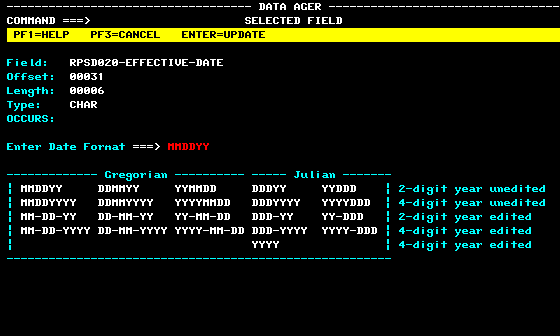 |
- Data Ager allows the user to optionally select each field presented for aging by entering the format of that date field.
- Data Ager supports over 20 different date formats.
4. The fourth ISPF screen displays a scrollable list of all the fields in the COBOL record layout.
- When Automatic Date Selection was chosen, these fields will already show a date format.
- Any other desired date field can be aged by selecting the field from the list and applying a date format.
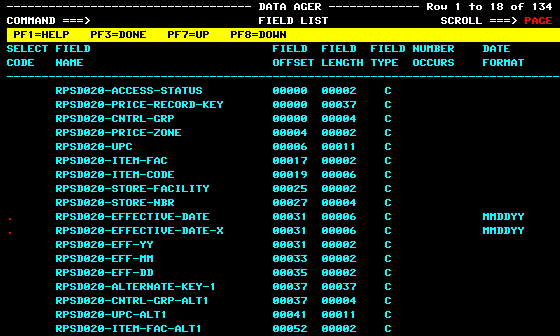 |
5.
The fifth ISPF screen displays the Generated JCL.
- The JCL executes the DAT batch component to process the requested aging.
- The JCL is presented in an ISPF edit session.
- The user can optionally submit the JCL for immediate execution or save it in a personal library for future execution.
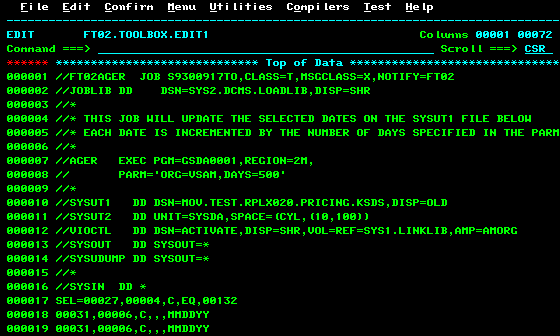 |
Product
use Recommendation
Data Ager can provide Customer with significant time and cost savings advantages for their project efforts, current “as-is” system testing, and future on-going system testing requirements on the z/OS platform. This product provides cost savings that will pay for itself many times over. The following is a list of some possible Data Ager product usage considerations.
- Programmers or QA analysts could use Data Ager to build properly aged files required for daily, weekly, quarterly and year-end baseline and regression testing.
- Prepare file-testing packets for outside vendors to perform unit testing on code renovation projects.
- Development staff can quickly create independent testing environments for concurrent simulation testing.
- Current “as-is” systems development staff can use Data Ager to reduce their current labor on testing setup.
- Operations and Development staff can use Data Ager to re-create problem resolution testing for production systems.
- Data Ager can provide automated support for Q/A and development environments.
Installation,
Customization and Training
Data Ager is available for any processor that supports the z/OS operating system. Data Ager utilizes ISPF/Dialog Manager (DM) and ISPF/Program
Development Facility (PDF). Data Ager supports all versions and releases of z/OS, ISPF (version 2.0 and higher) and VSAM.
Development Facility (PDF). Data Ager supports all versions and releases of z/OS, ISPF (version 2.0 and higher) and VSAM.
- Data Ager installation and customization takes less than 30 minutes.
- Data Ager is very easy to use. Detailed help tutorials are available for every Data Ager screen. Formal training is seldom required.
Operating Environment for DAT
DAT is available for any processor that supports the z/OS operating system environment. DAT utilizes ISPF/Dialog Manager (DM) and ISPF/Program Development Facility (PDF). DAT supports all versions and releases of z/OS.
Customer Service and Support
The DCMS toll-free Customer Support Hotline (800) 998-3848 is accessible 24
hours / 7 days a week. On-site training and consulting are available
for a nominal fee.
Cost
Savings Assumption Model
Business Application changes require system integration testing be performed on
a business process flow comprised of batch processing testing. This
testing includes the changed programs and the associated programs impacted by
the process changes. The model is based on “best case” industry averages.
Cost estimates are based on a $50.00 hourly rate.
This scenario assumes Company ABC requires changes to the Accounts Receivable system to adjust the aging algorithms. These changes impact online CICS programs which define the customer master detail records which define the terms for receipt and the related batch jobs performing system accrual, G/L hand off, etc. Complete testing requires that files be prepared to reflect future daily, monthly, quarterly, and year-end processing and reporting.
This scenario assumes Company ABC requires changes to the Accounts Receivable system to adjust the aging algorithms. These changes impact online CICS programs which define the customer master detail records which define the terms for receipt and the related batch jobs performing system accrual, G/L hand off, etc. Complete testing requires that files be prepared to reflect future daily, monthly, quarterly, and year-end processing and reporting.
Assumptions: |
Programs scheduled for modification |
20
|
|
Programs scheduled for testing |
100
|
||
Jobs scheduled for testing |
30
|
||
Files required for testing |
300
|
||
| Hourly Rate |
$50
|
||
Time required to modify 50 files |
200
|
Hours |
Sample Cost Savings
Testing Setup Function |
Manual Hours | Est. Manual Cost | Est. Data Ager Hours | Est. Data Ager Cost | ||
| Modify files for jobs |
200
|
$10,000.00
|
16.00
|
$800.00
|
||
| Totals: |
200
|
$10,000.00
|
16.00
|
$800.00
|
||
| Time Savings |
200 Hours - 16.00 Hours =
|
184 Hours | ||||
| Cost Savings |
184 Hours * $50.00 =
|
$9,200.00 | ||||
The following pricing is based on Software Group 60 processor pricing.
|
$10,000.00
|
Base product price (Software Group 60) | ||
|
$0.00
|
First year annual maintenance @ 15% of base product price | ||
|
$10,000.00
|
Total system delivery price |
- For additional information, contact your DCMS Representative at (952)473-3572 or sales@dcmsi.com.
